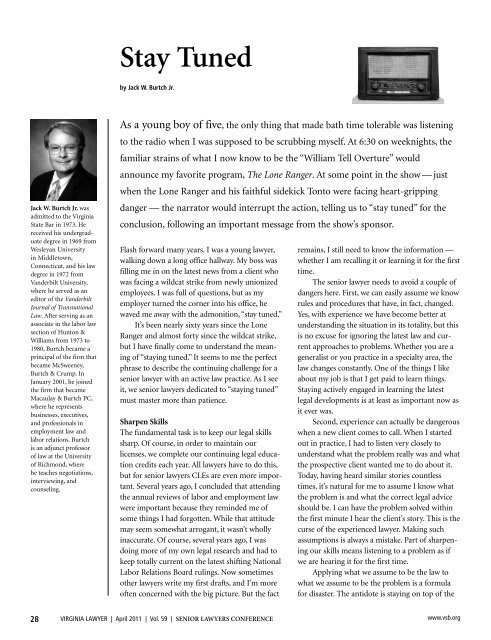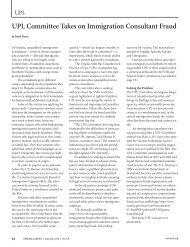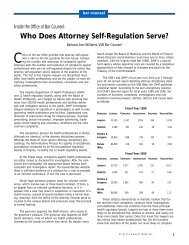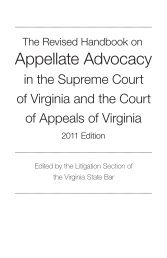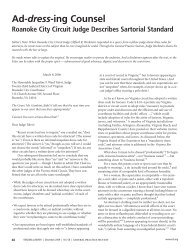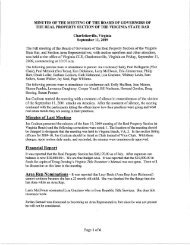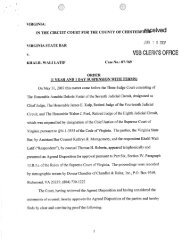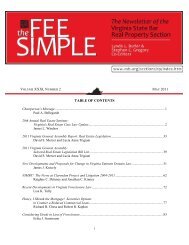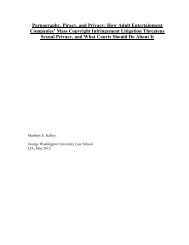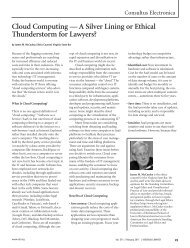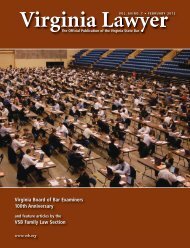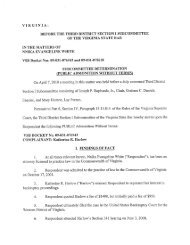Thomas Jefferson, Religious Freedom ... - Virginia State Bar
Thomas Jefferson, Religious Freedom ... - Virginia State Bar
Thomas Jefferson, Religious Freedom ... - Virginia State Bar
You also want an ePaper? Increase the reach of your titles
YUMPU automatically turns print PDFs into web optimized ePapers that Google loves.
Jack W. Burtch Jr. was<br />
admitted to the <strong>Virginia</strong><br />
<strong>State</strong> <strong>Bar</strong> in 1973. He<br />
received his undergraduate<br />
degree in 1969 from<br />
Wesleyan University<br />
in Middletown,<br />
Connecticut, and his law<br />
degree in 1972 from<br />
Vanderbilt University,<br />
where he served as an<br />
editor of the Vanderbilt<br />
Journal of Transnational<br />
Law. After serving as an<br />
associate in the labor law<br />
section of Hunton &<br />
Williams from 1973 to<br />
1980, Burtch became a<br />
principal of the firm that<br />
became McSweeney,<br />
Burtch & Crump. In<br />
January 2001, he joined<br />
the firm that became<br />
Macaulay & Burtch PC,<br />
where he represents<br />
businesses, executives,<br />
and professionals in<br />
employment law and<br />
labor relations. Burtch<br />
is an adjunct professor<br />
of law at the University<br />
of Richmond, where<br />
he teaches negotiations,<br />
interviewing, and<br />
counseling.<br />
28<br />
Stay Tuned<br />
by Jack W. Burtch Jr.<br />
As a young boy of five, the only thing that made bath time tolerable was listening<br />
to the radio when I was supposed to be scrubbing myself. At 6:30 on weeknights, the<br />
familiar strains of what I now know to be the “William Tell Overture” would<br />
announce my favorite program, The Lone Ranger. At some point in the show — just<br />
when the Lone Ranger and his faithful sidekick Tonto were facing heart-gripping<br />
danger — the narrator would interrupt the action, telling us to “stay tuned” for the<br />
conclusion, following an important message from the show’s sponsor.<br />
Flash forward many years. I was a young lawyer,<br />
walking down a long office hallway. My boss was<br />
filling me in on the latest news from a client who<br />
was facing a wildcat strike from newly unionized<br />
employees. I was full of questions, but as my<br />
employer turned the corner into his office, he<br />
waved me away with the admonition, “stay tuned.”<br />
It’s been nearly sixty years since the Lone<br />
Ranger and almost forty since the wildcat strike,<br />
but I have finally come to understand the meaning<br />
of “staying tuned.” It seems to me the perfect<br />
phrase to describe the continuing challenge for a<br />
senior lawyer with an active law practice. As I see<br />
it, we senior lawyers dedicated to “staying tuned”<br />
must master more than patience.<br />
Sharpen Skills<br />
The fundamental task is to keep our legal skills<br />
sharp. Of course, in order to maintain our<br />
licenses, we complete our continuing legal education<br />
credits each year. All lawyers have to do this,<br />
but for senior lawyers CLEs are even more important.<br />
Several years ago, I concluded that attending<br />
the annual reviews of labor and employment law<br />
were important because they reminded me of<br />
some things I had forgotten. While that attitude<br />
may seem somewhat arrogant, it wasn’t wholly<br />
inaccurate. Of course, several years ago, I was<br />
doing more of my own legal research and had to<br />
keep totally current on the latest shifting National<br />
Labor Relations Board rulings. Now sometimes<br />
other lawyers write my first drafts, and I’m more<br />
often concerned with the big picture. But the fact<br />
VIRGINIA LAWYER | April 2011 | Vol. 59 | SENIOR LAWYERS CONFERENCE<br />
remains, I still need to know the information —<br />
whether I am recalling it or learning it for the first<br />
time.<br />
The senior lawyer needs to avoid a couple of<br />
dangers here. First, we can easily assume we know<br />
rules and procedures that have, in fact, changed.<br />
Yes, with experience we have become better at<br />
understanding the situation in its totality, but this<br />
is no excuse for ignoring the latest law and current<br />
approaches to problems. Whether you are a<br />
generalist or you practice in a specialty area, the<br />
law changes constantly. One of the things I like<br />
about my job is that I get paid to learn things.<br />
Staying actively engaged in learning the latest<br />
legal developments is at least as important now as<br />
it ever was.<br />
Second, experience can actually be dangerous<br />
when a new client comes to call. When I started<br />
out in practice, I had to listen very closely to<br />
understand what the problem really was and what<br />
the prospective client wanted me to do about it.<br />
Today, having heard similar stories countless<br />
times, it’s natural for me to assume I know what<br />
the problem is and what the correct legal advice<br />
should be. I can have the problem solved within<br />
the first minute I hear the client’s story. This is the<br />
curse of the experienced lawyer. Making such<br />
assumptions is always a mistake. Part of sharpening<br />
our skills means listening to a problem as if<br />
we are hearing it for the first time.<br />
Applying what we assume to be the law to<br />
what we assume to be the problem is a formula<br />
for disaster. The antidote is staying on top of the<br />
www.vsb.org


